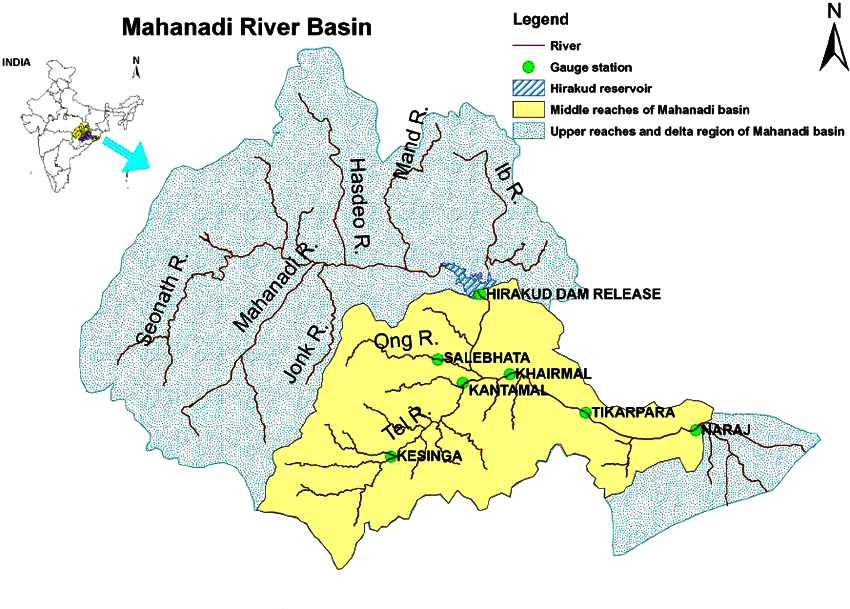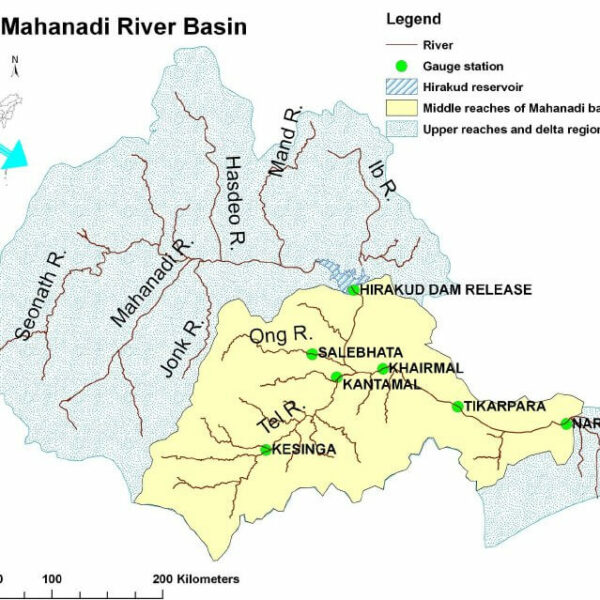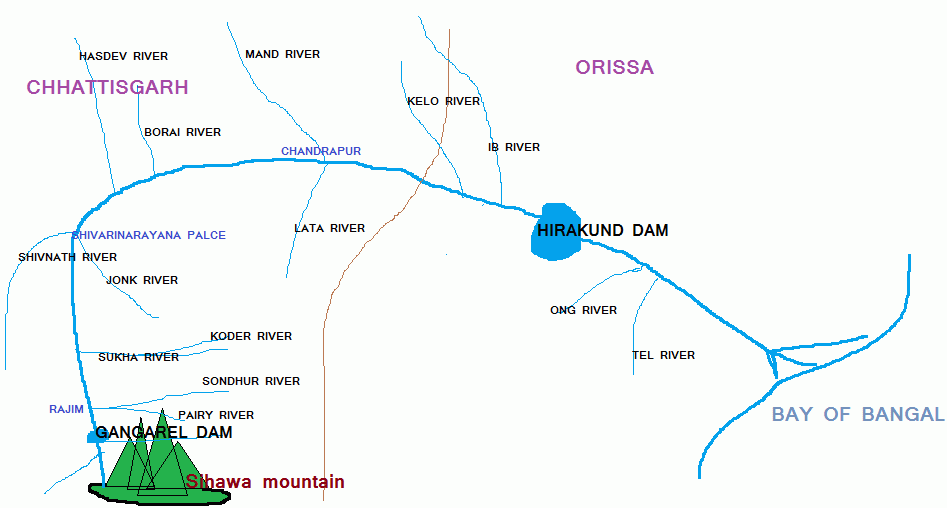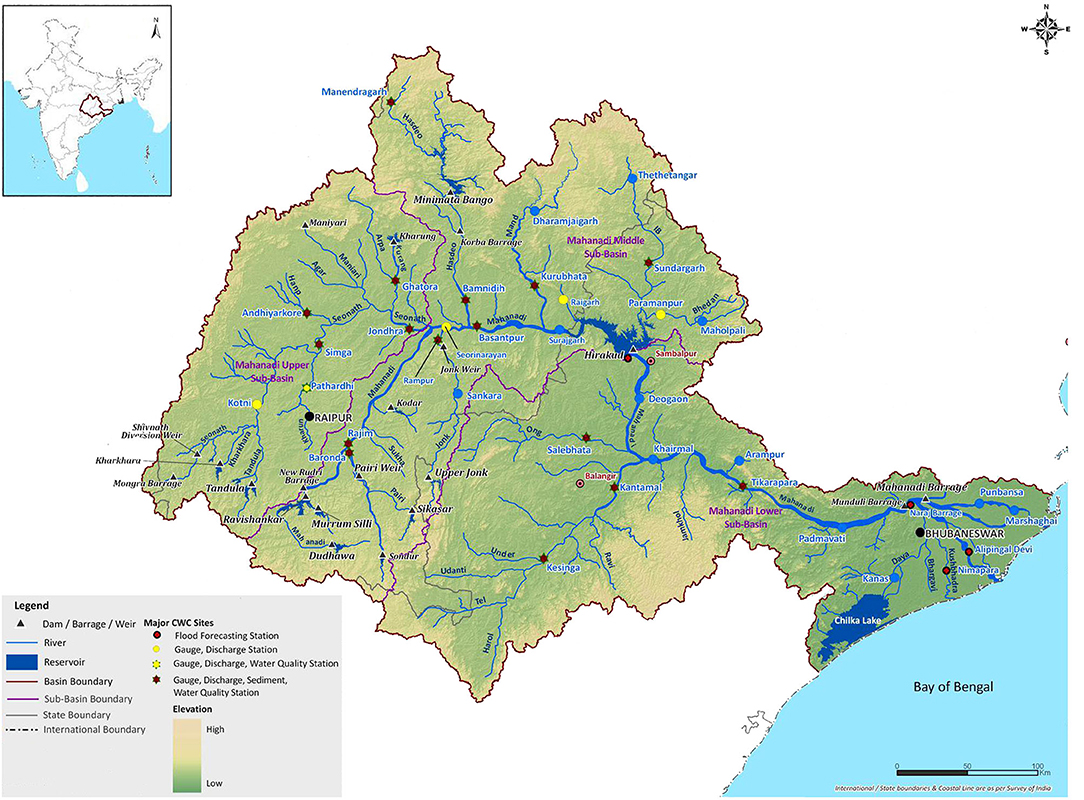
Master Mahanadi river 2021 [Map] UPSC Colorfull notes Geography map
Geographical Features of the Mahanadi River. Here are some key geographical features of the Mahanadi River: Length: The Mahanadi River is 858 km long, making it the sixth-largest river in India. Origin: The river originates from the hills of Chhattisgarh, near the town of Sihawa in the Dhamtari district. Basin: The Mahanadi River basin covers an area of 141,600 sq. km, of which 54% lies in.

Locations of sampling sites of the Mahanadi River Basin, India
The Mahanadi basin extends over an area of 141,589 km2 which is nearly 4.3% of the total geographical area of the country. It lies between east longitudes 80° 30' to 86° 50' and north latitudes 19° 21' to 23° 35'. It is bounded on the north by the Central India hills, on the south and east by the Eastern Ghats and on the west by the Maikala.

a Location of Mahanadi Basin in India. b Mahanadi Basin map (Source
The video deals with East Flowing Peninsular Rivers. The video includes separate sections describing Origin, Course, Length,Tributaries and other features of.

Figure 1 from Flood Forecasting and Inundation Mapping in the Mahanadi
Ong River. Ong River is another major tributary of the Mahanadi. This river starts at the Nawapara district and then flows into the extreme south west side of Padampur region. The course of the river is a wide semi circle leaving the district of Gaisilat by a few kilometers and then joining with the Mahanadi in the district of Subarnapur.

Map showing the Mahanadi river basin and Hirakud reservoir Download
Mahanadi. Mahanadi is one of the important Rivers of India. The river lies in east central India. The length of the river is 559 miles or 900 km. The river has a catchment basin of approximately.
The Mahanadi river basin boundary and the analysed flow gauges and
The Mahanadi River ranks second in water potential among peninsular rivers, with only the Godavari River surpassing it.. The river basin covers about 1,41,589 sq km, accounting for about 4.3% of India's total geographical area.. The Mahanadi basin is bordered by natural features, including the Central India hills to the north, the Eastern Ghats to the south and east, and the Maikala range to.

Peninsular River Of India Mahanadi, Godavari, Krishna, Kaveri & Its
Mahanadi (məhä´nədē), river, c.550 mi (885 km) long, rising in S Chhattisgarh state, central India, and flowing north then east through a gorge in the Eastern Ghats, across Odisha (Orissa) state, forming a delta before entering the Bay of Bengal near Cuttack. The Tel and Hasdo rivers are its main tributaries. The Hirakud Dam, at Sambalpur, is the world's largest earthen dam and supports.

Peninsular 'East Flowing' Rivers with MAPS [Mahanadi,Godavari,Krishna
Mahanadi River History. The river's name comes from the Sanskrit word Maha which means great and the word Nadi which means river. During different periods of time it was referred to by different names such as Kanak Nandini, Chitrotpala,Nilotpala, Mahananda and Mahanadi or Mahashweta. It uses up around 54,600 sq miles and is totally 533 miles.

Index map of the delta region of Mahanadi River basin in India
Mahanadi River. The Mahanadi basin drains an area of 1.4 lakh square kilometres and spans the states of Chhattisgarh and Odisha, as well as minor areas of Jharkhand, Maharashtra, and Madhya Pradesh.; It is flanked on the north by the Central India hills, on the south and east by the Eastern Ghats, and on the west by the Maikala range.; The Mahanadi ("Great River") has a total length of 560.

Mahanadi River
Mahanadi, the 'Great River', is a major rain-fed peninsular river in East Central India that flows through states of Chhattisgarh and Odisha and meets the water requirement for irrigation, domestic and industrial purposes in part of these states.The farthest headwater of the river lies on Sihawa hills. It splits into various channels at Naraj in Odisha, and emerge into an arcuate shaped delta.

Mahanadi Station map, Map, River
The Mahanadi River is a major river in East Central India.It drains an area of around 132,100 square kilometres (51,000 sq mi) and has a total length of 900 kilometres (560 mi). Mahanadi is also known for the Hirakud Dam which was the first major multipurpose river valley project after India's independence in 1947. The river flows through the states of Chhattisgarh and Odisha and before.

Mahanadi River System
The Mahanadi ("Great River") follows a total course of 560 miles (900 km) and has an estimated drainage area of 51,000 square miles (132,100 square km). Mahanadi River. It is one of the most-active silt-depositing streams in the Indian subcontinent. Its upper course runs north as an insignificant stream, draining the eastern Chhattisgarh Plain.

Mahanadi River
The Godavari River is an important River in India and it flows from western to southern India. The catchment area of the river is regarded as one of the biggest in the country. The river is 1,465.

Study area showing the Ong and the Tel subbasins of the Mahanadi River
Hasdo River rises at a height of 915 meter at a place in the Sarguja district of Chhattisgarh. The Hasdo river covers a length of nearly to merge into the Mahanadi river on its left near to the village Mahuadih. of the Hasdo river is 9,856 sq. km, which is about 6.96% of the Mahanadi basin area. The principal sub tributary of the Hasdo River is.

Frontiers The Climate Challenge in Managing Water Evidence Based on
Mahanadi River Map Mahanadi River Mahanadi River System. This river system is known to be ranked second in terms of water potential among the peninsular rivers. It is the biggest river that is situated in Odisha. The word 'Mahanadi' is a combination of two Sanskrit terms. They are 'Maha', which means great, and the term 'Nadi' means.

"Mahanadi River The Mighty Lifeline of East Central India" [2023 Map
The Mahanadi River system is the third largest of peninsular India after Godavari and Krishna, and the largest river of Odisha state. The catchment area of the river extends to Chhattisgarh, Madhya Pradesh, Odisha, Jharkhand and Maharashtra. Its basin is bounded by the Central India hills on the north, by the Eastern Ghats on the south and east.